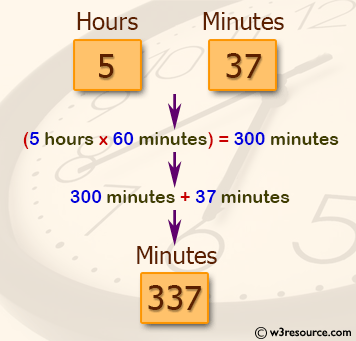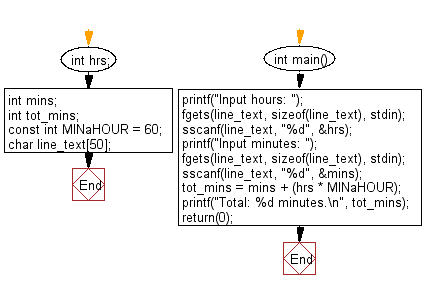C Exercises: Calculates the total number of minutes with hour and minutes
C Input Output statement: Exercise-5 with Solution
Write a C program that takes hours and minutes as input, and calculates the total number of minutes.
Pictorial Presentation:

Sample Solution:
C Code:
#include <stdio.h>
int hrs; /* given number of hours */
int mins; /* given number of minutes */
int tot_mins; /* total number of minutes (to be computed) */
const int MINaHOUR = 60; /* number of minutes in an hour */
char line_text[50]; /* line of input from keyboard */
int main() {
printf("Input hours: ");
fgets(line_text, sizeof(line_text), stdin);
sscanf(line_text, "%d", &hrs);
printf("Input minutes: ");
fgets(line_text, sizeof(line_text), stdin);
sscanf(line_text, "%d", &mins);
tot_mins = mins + (hrs * MINaHOUR);
printf("Total: %d minutes.\n", tot_mins);
return(0);
}
Sample Output:
Input hours: 5 Input minutes: 37 Total: 337 minutes.
Flowchart:

C Programming Code Editor:
Improve this sample solution and post your code through Disqus.
Previous: Write a C program that converts kilometers per hour to miles per hour.
Next: Write a program in C that takes minutes as input, and display the total number of hours and minutes.
What is the difficulty level of this exercise?
Test your Programming skills with w3resource's quiz.
C Programming: Tips of the Day
Static variable inside of a function in C
The scope of variable is where the variable name can be seen. Here, x is visible only inside function foo().
The lifetime of a variable is the period over which it exists. If x were defined without the keyword static, the lifetime would be from the entry into foo() to the return from foo(); so it would be re-initialized to 5 on every call.
The keyword static acts to extend the lifetime of a variable to the lifetime of the programme; e.g. initialization occurs once and once only and then the variable retains its value - whatever it has come to be - over all future calls to foo().
Ref : https://bit.ly/3fOq7XP
- New Content published on w3resource:
- HTML-CSS Practical: Exercises, Practice, Solution
- Java Regular Expression: Exercises, Practice, Solution
- Scala Programming Exercises, Practice, Solution
- Python Itertools exercises
- Python Numpy exercises
- Python GeoPy Package exercises
- Python Pandas exercises
- Python nltk exercises
- Python BeautifulSoup exercises
- Form Template
- Composer - PHP Package Manager
- PHPUnit - PHP Testing
- Laravel - PHP Framework
- Angular - JavaScript Framework
- Vue - JavaScript Framework
- Jest - JavaScript Testing Framework
